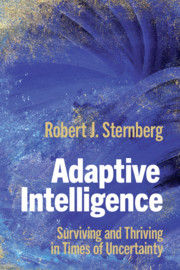Book contents
- Adaptive Intelligence
- Adaptive Intelligence
- Copyright page
- Dedication
- Contents
- Tables
- Preface
- Chapter 1 Introduction
- Chapter 2 What Is Intelligence? A Panoply of Views
- Chapter 3 Intelligence as the Broad Ability to Adapt to the Environment
- Chapter 4 Why General Intelligence May Be Unhelpful, or Detrimental, in Times of Instability, and for that Matter, in Other Times as Well
- Chapter 5 History of the Theory of Adaptive Intelligence
- Chapter 6 Measurement and Teaching of Adaptive Intelligence
- Chapter 7 Why Do People Persist in Species-Suicidal Beliefs and Practices and What’s to Be Done?
- Chapter 8 The Great Adaptive-Intelligence Test
- Index
Chapter 4 - Why General Intelligence May Be Unhelpful, or Detrimental, in Times of Instability, and for that Matter, in Other Times as Well
Published online by Cambridge University Press: 21 January 2021
- Adaptive Intelligence
- Adaptive Intelligence
- Copyright page
- Dedication
- Contents
- Tables
- Preface
- Chapter 1 Introduction
- Chapter 2 What Is Intelligence? A Panoply of Views
- Chapter 3 Intelligence as the Broad Ability to Adapt to the Environment
- Chapter 4 Why General Intelligence May Be Unhelpful, or Detrimental, in Times of Instability, and for that Matter, in Other Times as Well
- Chapter 5 History of the Theory of Adaptive Intelligence
- Chapter 6 Measurement and Teaching of Adaptive Intelligence
- Chapter 7 Why Do People Persist in Species-Suicidal Beliefs and Practices and What’s to Be Done?
- Chapter 8 The Great Adaptive-Intelligence Test
- Index
Summary
I propose in this book that society and the scholars it supports need to return to the original definition of intelligence as “adaptation to the environment.” Intelligence as adaptation is not, and really never has been about people’s ability to solve trivial, artificial, largely meaningless multiple-choice or short-answer problems on tests designed to measure their intelligence, aptitudes, abilities, school knowledge and skills, or other such constructs. Rather, intelligence as adaptation is about people’s ability to act in ways that help to attain a collective or common good – ways that make the world a better, not a worse place. Many societies’ narrow-minded and compulsive focus on individual achievements, even those attained at the expense of the common good, has resulted in a seriously warped view of intelligence as something of a zero-sum game, where people compete with each other for higher test scores and the resulting outcomes that benefit some at others’ expense. We instead need to think collectively so as to preserve not only our own future, but that of the world as we know it and would want to know it in the future.
- Type
- Chapter
- Information
- Adaptive IntelligenceSurviving and Thriving in Times of Uncertainty, pp. 127 - 148Publisher: Cambridge University PressPrint publication year: 2021



